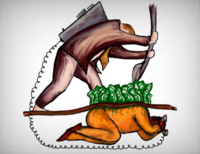Recognizing National Reentry Week and the harms of over-criminalization
It’s time to recognize that if we really care about taxpayers’ dollars, public safety, and the wellbeing of all communities, prisons and jails should be the last places we want to put people suffering from addiction.
by Lucius Couloute, April 28, 2017
Last year, as part of the Obama Administration’s agenda on criminal justice reform, acting Attorney General Loretta Lynch declared April 24th-30th National Reentry Week. Unfortunately, the current administrations seems to have shelved the idea, in favor of appearing tougher on crime and cracking down on drugs in the “inner-city”. But we want to take the opportunity to join grassroots leaders across the country in drawing attention to the importance of reentry today.
At a time when the future of mass incarceration is unclear, it is important to recognize that our criminal justice policy decisions have real and lasting consequences for millions of people across the country. And although the current administration appears to be interested in reframing the debate, history suggests that the ‘tough-on-crime’ strategy, especially as it pertains to drug use, is a flawed one.
As a sociologist examining the difficult road of reentry for formerly incarcerated people, I’ve listened to countless stories about the harms of addiction.
Very frequently I hear from formerly incarcerated people about how ordinary tasks like going to work, taking care of kids, or taking classes are made much more difficult when contending with a present or past dependence on drugs.
But it isn’t just that addiction makes life difficult. Even when formerly incarcerated people feel they’ve kicked their habit, the effects of having been formally criminalized because of an addiction can actually work against recovery.
When I asked about his robbery convictions and their connection to his decades-long struggle with heroin, Alex, a 49 year-old Latino man told me:
“[My crimes] are a means to keep getting money to keep getting high … And in my case I get so messed up that I say, ‘you know something? Time for me to go back in and clean myself up, gain some weight and try [to stay sober] again.’ But that place is only going to mess you up more, mentally. Because … addiction services in prison are almost nonexistent.”
Alex isn’t exaggerating about the lack of drug treatment available to incarcerated people. Despite the fact that an estimated 80% of incarcerated people are dealing with some form of addiction, only about 11% of the people who need treatment actually receive it in prison or jail.
The good news is that states are beginning to recognize that addiction is a medical issue and should probably be addressed outside of correctional facilities. Unfortunately, though, the criminalization of drug dependence has wreaked havoc on communities of color for years and continues to shape the lives of people like Alex.
Alex spends most of his time now looking for jobs, safe places to stay, and fighting off the urge to use – but having a criminal record makes each of these tasks difficult. He believes people like him are alone in their battle for a better life. But as he puts it, “We did that to ourselves. Because we keep repeating the same mistakes so many times that people lose faith in us. People give up.” Having constantly been told that his personal choices led to his criminal record, Alex’s cynicism reflects an institutional-level inability to address the source of his criminal behavior – a dependence on heroin.
By misrecognizing crime as a function of character our criminal justice system does little to help people like Alex lead law-abiding lives.
And confounding the causes of crime, in this way, occurs more than we think. Current estimates suggest that about 20% of incarcerated people are locked up because of a drug offense, but drugs probably play a role in a far greater number of criminal offenses than the statistics imply. People in prison for multiple offenses are reported in official records only for the most serious ones, so some people incarcerated for “violent” offenses might have also been charged with a drug offense too. Not to mention that about 1/3rd of people who commit crimes are estimated to have been using drugs at the time of their last offense.
In many cases that don’t appear to be driven by drug-seeking behavior (like Alex’s robbery convictions), addiction very well may have played a significant role. Yet as Alex points out, few people receive holistic long-term services before, during, or even after their incarceration.
Effective treatment is costly, yes, but compared to the cost of incarceration, drug treatment is a bargain. If we fail to provide people suffering from addiction the resources they need to function, the criminal justice system will continue to squander taxpayer dollars in an endless cycle of incarceration, release, and re-incarceration.
As National Reentry Week 2017 comes to an end, it’s time to recognize that if we really care about taxpayers’ dollars, public safety, and the wellbeing of all communities, prisons and jails should be the last places we want to put people suffering from addiction.



